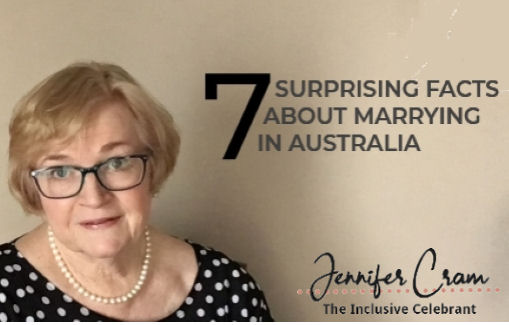7 Surprising Facts about
Getting Married in Australia
Categories: | Wedding Legals | Wedding Planning |
 Australia is one of the easiest countries
in the world to get married in simply because couples
encounter so few of the rules that are common in other
countries.
Australia is one of the easiest countries
in the world to get married in simply because couples
encounter so few of the rules that are common in other
countries.No permission needed (no licences), no restrictions on who can marry, apart from a minimum age, or on who you can marry apart from extremely close family relationships by blood or adoptions. And no medical or religious restrictions.
That there are so few rules comes as a surprise to many marrying couples, and often triggers conversations about things they expected were a rule, and aren't!
1. You marry yourselves
out
Your celebrant doesn't marry you, you marry
yourselves. And you do that by saying the required
words laid down in the Marriage Act in the presence of
an authorised celebrant and two witnesses. Once you
both have said those words you are legally married.
Signing of your certificates after you have said those
words just documents the fact that you are married,
and registering your marriage ensures there is a
public record of your marriage.2. You can marry in secret
out
No-one,
other than the two of you and your celebrant needs
to know that you are getting married ahead of
time. You must lodge your Notice of Intended
Marriage with your celebrant at least a month
before, but it goes nowhere. Your celebrant keeps
it until after you are married, and only then, at
the point where your marriage papers are forwarded
to Births, Deaths, and Marriages in the state in
which you got married to register your marriage,
is a government authority informed that you are
married. This means you can get married in secret.3. Your civil ceremony
doesn't have to be completely secular
out
When marrying in a civil ceremony with a marriage
celebrant, while most people choose to have a
completely secular ceremony it is perfectly
permissible to include some expression of personal
religious or spiritual beliefs though your civil
celebrant can't force you to include religion. You can
also omit all of the traditional elements that are
generally associated with a wedding ceremony -
including special clothes, rings, pronouncement, kiss.4. You must have two
witnesses, no more, no fewer
out
You must have two adult witnesses present for the whole
ceremony, but they don't have to have advance warning,
so asking them to be your witnesses one minute before
the ceremony is fine (just enough time to explain and
for them to consent to being your legal witnesses).5. Your witnesses witness your
marriage, not your signatures
out
Your
witnesses are witnessing your marriage, so when they
sign the certificates they aren't witnessing your
signatures, they are attesting to the fact that the
marriage took place in their presence.6. Your visa status is
irrelevant
out
It doesn't matter whether you are an Australian citizen
by birth or by naturalisation, a permanent resident, a
tourist, here on a work, study, or bridging visa, or
even illegally in the country. Anyone who meets the
legal criteria for getting married in Australia (at
least 18, not in a close relationship by blood or
adoption, not married to anyone else, and marrying
freely and willingly after giving a month's notice and
proving ID) can marry here7. Sex after marriage is
optional
out
Australia does not require consummation of a marriage in
order to make it stick. With wonderful sensitivity our
law makers realised that there would be no way to
ascertain that consummation of a marriage was
consensual. So, if you marry, the only way to end the
marriage is by divorce. Annulment is only for marriages
that should never have taken place because they were
unlawful.Thanks for reading!
